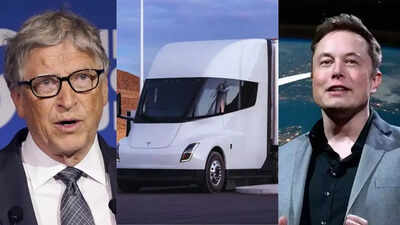ARTICLE AD BOX

Electric heavy-duty trucks
have been a topic of debate among industry leaders for years. While Microsoft founder Bill Gates has expressed skepticism about the practicality of fully electric 18-wheelers, Elon Musk, CEO of
Tesla
Inc., remains confident in their future. “Tesla Semi is not just feasible, it’s the future of trucking,”
Musk
has said, affirming that his company’s all-electric Semi truck will hit volume production next year. His bold claim comes amid growing global interest in electrifying freight transportation to cut emissions and reduce reliance on fossil fuels. As Tesla gears up to ramp production in 2026, industry watchers are eager to see whether the Semi can deliver on its promises and truly compete with traditional diesel trucks.
Bill Gates’ skepticism on electric 18-wheelers
Bill Gates has consistently argued that fully electric 18-wheelers face fundamental limitations, focusing on the technical challenge of batteries for heavy-duty long-haul trucks. He has stated that the high energy density required to move large payloads over long distances with batteries results in trucks carrying more battery weight, which in turn reduces their efficiency and practicality. Gates believes this makes electrification particularly tough for heavy freight, cargo ships, and passenger jets. Even with ongoing progress in battery technology, Gates maintains that batteries alone are unlikely to solve the unique needs of long-haul, heavy trucking, and has suggested that alternatives like hydrogen fuel cells or synthetic electrofuels may be more practical for these larger, energy-intensive applications. He’s also noted that these synthetic fuels could be used in existing engines, minimizing the need for wholesale changes in infrastructure.
Elon Musk’s vision for Tesla Semi
Elon Musk, meanwhile, has reaffirmed that Tesla’s all-electric Semi truck will begin volume production in 2026. The company has constructed a dedicated production facility near Gigafactory Nevada with an expected annual output of 50,000 units when fully ramped. While actual output in the first year may be lower, Tesla’s leadership, including Dan Priestley, head of the Semi program, has publicly shared that the company is preparing for full-scale manufacturing to start in 2026. Tesla’s Semi, since its unveiling in 2017, has promised a range of 500 miles per charge, top-tier acceleration and torque, and a gross vehicle weight comparable to that of traditional diesel trucks.Tesla’s strategy goes beyond the US: the company has signaled intentions to expand the Semi’s market into Europe, where stricter emissions regulations and dense logistics routes present both challenges and opportunities. In addition, Tesla continues to invest in its Megacharger high-speed charging network designed to address heavy-duty fleets specifically.
Tesla’s expanding electric vehicle lineup
Tesla is not only pushing into the heavy-duty sector. The Cybertruck, a full-size electric pickup, officially launched production at Gigafactory Texas in late 2023, with three drivetrain variants now on the US and Canadian markets. Reports also point to Tesla exploring a smaller electric pickup and an autonomous “Cyber Cab,” specifically aimed at the ride-hailing segment, reinforcing its aim to diversify its electric portfolio further into transportation classes previously dominated by internal combustion.
Challenges ahead for electric freight trucks
The main challenges for electric heavy-duty trucks include the need for a robust high-capacity charging infrastructure and sufficient grid capacity, as current networks cannot always support the rapid, high-power charging required for long-haul fleets. Heavy batteries add significant weight, reducing payload capacity and fleet profitability, while also limiting range compared to diesel or hydrogen alternatives. High upfront costs, slower charging times, and limited range, often between 100 to 300 miles for most models, affect operational efficiency. Additionally, sourcing affordable, renewable electricity is still a hurdle, and while hydrogen fuel cell trucks offer lighter weight and faster refueling, they face infrastructure gaps and higher production costs.
The road ahead for Tesla Semi Truck
The positive momentum behind electric heavy-duty trucks is clear, with thousands of units already deployed in regional routes and last-mile logistics in 2024 and 2025, spurred by lower battery costs, new product launches, and increasingly favorable policy and regulatory landscapes. But for truly widespread, long-range electrification, especially in the heavy-duty, long-haul segment, substantial challenges remain. As both startups and legacy manufacturers invest in solutions, options like hydrogen and advanced synthetic fuels will likely complement batteries, especially for the most demanding trucking applications.



.png)
.png)
.png)
















 2 hours ago
6
2 hours ago
6









 English (US) ·
English (US) ·